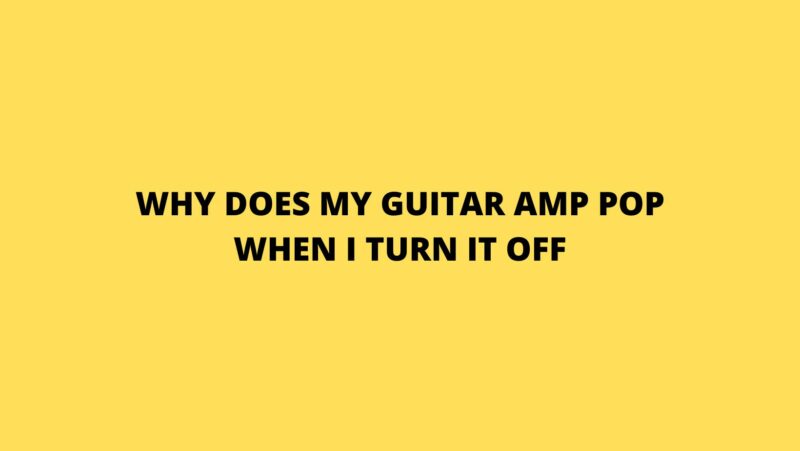Guitar amplifiers, the conduits of sonic expression, carry the power to transform chords into melodies. Yet, as the final notes ring out and you power down your amplifier, an unexpected guest often joins the symphony—the pop. This post-performance pop can raise questions and curiosities. In this article, we embark on a journey to demystify the reasons behind why guitar amplifiers pop when turned off, diving into the underlying mechanics that lead to this occurrence and exploring whether it’s a cause for concern or an inherent aspect of amplifier operation.
The Postlude: Uncovering the Amplifier Pop
The pop that emerges as you power off your guitar amplifier is a sonic manifestation of the transient voltage changes that occur within the amplifier’s circuitry during shutdown. Much like the initial pop during startup, this phenomenon is a byproduct of the interplay between components as they adjust to the withdrawal of power.
Decoding the Mechanism of the Off-Pop
To truly understand why guitar amplifiers pop when turned off, we must delve into the intricate sequence of events that unfold within the amplifier’s circuitry during the shutdown process:
- Capacitor Discharge: As your guitar amplifier operates, certain capacitors store electrical energy. When you power off the amplifier, these capacitors gradually discharge. The sudden removal of power upon shutdown accelerates the discharge process, leading to a transient flow of current that generates the audible pop.
- Voltage Reversal: The rapid discharge of capacitors leads to a momentary voltage reversal within the amplifier’s circuitry. This reversal results in a brief and sudden change in voltage levels, giving rise to the distinctive pop sound.
- Signal Path Transition: Similar to startup, the pop can also stem from the transition of the amplifier’s signal path from active to inactive. As the various pathways and components within the amplifier adjust to the power-off state, voltage and current changes contribute to the pop.
The Harm Factor: Is the Off-Pop Damaging?
Much like the initial pop during startup, the pop that occurs when powering off a guitar amplifier is generally not harmful to the amplifier itself or connected speakers. It’s a natural byproduct of the abrupt cessation of power and the subsequent adjustments within the amplifier’s circuitry. However, as with any repeated stress, overly loud or frequent popping noises could potentially lead to wear and tear on components over time.
Minimizing or Preventing the Off-Pop
While the off-pop is generally innocuous, there are strategies that can help mitigate its impact:
- Power Down Sequence: Consider disconnecting your speakers or instruments before powering off your amplifier. This can minimize the impact of the off-pop on your audio chain.
- Standby Mode: If your amplifier has a standby mode, engage it before powering down. This can allow the amplifier’s components to stabilize gradually, reducing the intensity of the pop.
- Power Conditioners: Some power conditioners feature delay functions that introduce a time delay between power-off and complete shutdown. This can give the amplifier’s circuitry time to discharge and stabilize, lessening the impact of the pop.
Conclusion
The pop that accompanies the act of powering off a guitar amplifier is a result of the intricate interactions between electrical components adjusting to the abrupt withdrawal of power. While it might initially raise questions, it’s generally a benign and expected aspect of amplifier operation. Understanding the mechanisms behind the off-pop empowers you to embrace it as part of the amplifier’s natural behavior. As you navigate the sonic landscape of music and technology, let the science of the off-pop deepen your appreciation of the fusion between creativity and scientific intricacy.


